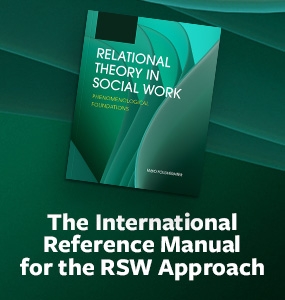Editorial
Fabio Folgheraiter
Catholic University of Milan, Italy
I’m glad to present the new issue of our online journal Relational Social Work. In this issue, we can read interesting theoretical and research papers and exciting reflections based on practical experience in the field of social work.
The first article discusses the involvement of service users and carers as co-educators in social work education, in particular during the Covid-19 pandemic. Lonbay, Russell and Smiles from the U.K. highlight two challenges related to service users’ and carers’ involvement in online social work courses: the first, access to and use of technology, and the second, the difficulties of creating safe and meaningful spaces online. Starting from their experiences and studies, in their paper the authors offer important suggestions for continuing the involvement of co-educators in social work education.
The second paper focuses on recovery-oriented programmes within the mental health service field. Balenzano and Moro from Italy carried out some research, based on mixed-methods, on the coherence, effectiveness and social impact of a recovery-oriented programme implemented in a southern Italian mental health service. The research involved staff members of the recovery programme, beneficiaries of the analysed programme and patients following traditional rehabilitation programmes. This study highlights the effectiveness of recovery-oriented programmes in reducing patient stigmatization and promoting their recovery and quality of life.
As usual, the second part of the journal is dedicated to voices from practice, shorter contributions related to Social Work practices inspired by the principles of the Relational Social Work method. The first paper, written by Jean Pierre Wilken from the Netherlands, describes the CARe model, used in social work and care practices around Europe, especially in mental health care and homeless care. This model is based on a compassionate personal-professional relationship between service providers, service users and the wider social network. The author presents the main features and methodological framework of the CARe model, enhancing its strong points, such as the opportunity to enable professionals to support people in their personal recovery process.
Next, Corradini and Tagliabue in their paper present an innovative social work experience carried out by a social work student during the Covid-19 pandemic. The student supported a group of adolescents in a process of reflection on the pandemic and the difficulties caused by social distancing and the lockdown imposed by the health emergency, creating a Quarantine Survival Manual, written by adolescents for adolescents. Furthermore, the authors offer a methodological reflection on the opportunity of applying the principles and key ideas of the Relational Social Work method, even in a situation that does not allow people to meet face to face.
In conclusion, we can read an interesting description of another project in the mental health field, implemented in Italy during the Covid-19 pandemic. The paper, written by Clementi and Occhi, presents an experience of peer telephone support offered to people with mental health problems and their family members by Experts by Experience. The authors report the points of view of peer supporters, who underline the difficulties in guaranteeing remote support to patients and their families. The paper highlights the importance of the role played by peer supporters in problem solving processes, together with practitioners, people with mental health problems and their family members.
I sincerely thank all the authors for their interesting and stimulating contributions, as well as for their commitment in improving Relational Social Work studies and reflections.
Milan, April 2021




